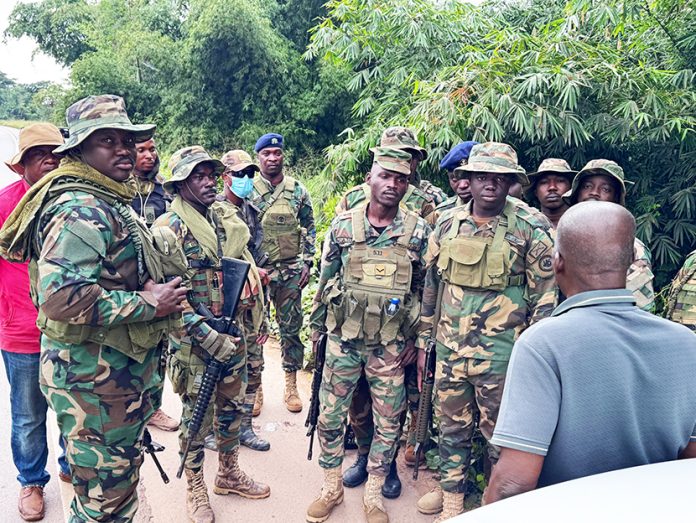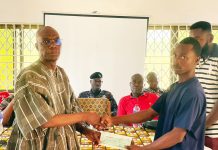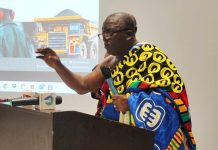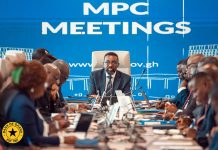In a dawn operation sanctioned by the Western Regional Security Council, a joint security task force has seized seven excavators, 18 water pumping machines and a pump-action gun from illegal miners operating in the Neung South Forest Reserve in the Tarkwa Nsuaem Municipality.
The operation, which was intelligence-led and meticulously planned, was spearheaded by Brigadier General Musah Whajah (Rtd), Western Regional National Security Liaison Officer.
It was supported by the Second Infantry Battalion, the Western Naval Command and the office of the Western Regional Minister, Joseph Nelson.
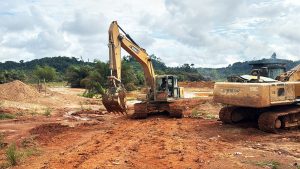
According to Brigadier General Whajah, the task force moved in following credible intelligence about intensified illegal mining, known locally as galamsey within the forest reserve, an area that has suffered severe environmental degradation.
“The intelligence we gathered indicated serious illegal mining activities along the Neung South Forest Reserve. During the operation, we came across seven excavators, two had been self-sabotaged, five were in good condition but had their control boards removed.
“We managed to secure two and removed the control boards of three others, which have been sent to the Simpa Police Station,” Brigadier General Whajah said.
He added that 18 water pumping machines and a pump-action gun were also retrieved during the operation, while all makeshift mining structures at the site were destroyed to prevent reoccupation.
Interestingly, in contrast to previous raids, where miners were known to rely on spiritual charms, the team this time discovered only a single Bible left behind in the deserted camp.
Brigadier General Whajah stressed the need for sustained operations to completely eliminate illegal mining within the Neung South Forest Reserve, citing the alarming level of destruction to the region’s water bodies and vegetation.
“We need to sustain this operation, looking at the level of devastation. Our goal is to rid the entire forest reserve of illegal miners once and for all,” he emphasised.
In another development, with barely a week to Côte d’Ivoire’s presidential elections, the Western Regional Minister, Joseph Nelson, has called for heightened vigilance at Ghana’s Western frontier amid an influx of Ivorian nationals entering the country through the Elubo border and other unapproved routes.
Ivory Coast is scheduled to hold its presidential polls on October 25, and reports of isolated disturbances have already begun emerging.
Security officials in Ghana have confirmed that some Ivorians, fearing potential unrest, have started crossing into the country in search of refuge.
During a visit to the Elubo border post, Mr. Nelson urged border agencies to remain alert and coordinate efforts to prevent potential security breaches.
“We have noticed an increase in movements across our border as Ivory Coast approaches its elections. I am urging all security services here to intensify surveillance and ensure Ghana’s territorial integrity is maintained,” the minister said.
Deputy Commissioner of Immigration Joshua Krakue, who heads the Elubo Command, disclosed that many of the arriving Ivorians initially enter Ghana without declaring themselves as asylum seekers.
“They don’t usually identify as asylum seekers at the point of entry, but later turn up at refugee camps,” DCI Krakue explained.
According to information gathered, about 1,548 Ivorian nationals have entered Ghana in the past three months.
Their precise locations are, however, yet to be verified. At the Ampain Refugee Camp in the Ellembelle District, officials confirmed the presence of nearly 400 Ivorian refugees, most of whom fled over fears of post-election violence.
One of them, Dider Denyan, told reporters he left his home country out of fear that this year’s elections could trigger chaos similar to what occurred more than a decade ago, when thousands fled into Ghana’s Nzema enclave.
“We don’t want to experience what happened years ago again. It’s safer here until things calm down,” Denyan said.
The Western Regional Security Council says it is closely monitoring developments at the border while maintaining communication with the Ghana Refugee Board and the United Nations High Commissioner for Refugees (UNHCR) to coordinate humanitarian and security responses.
For more news, join The Chronicle Newspaper channel on WhatsApp: https://whatsapp.com/channel/0029VbBSs55E50UqNPvSOm2z

